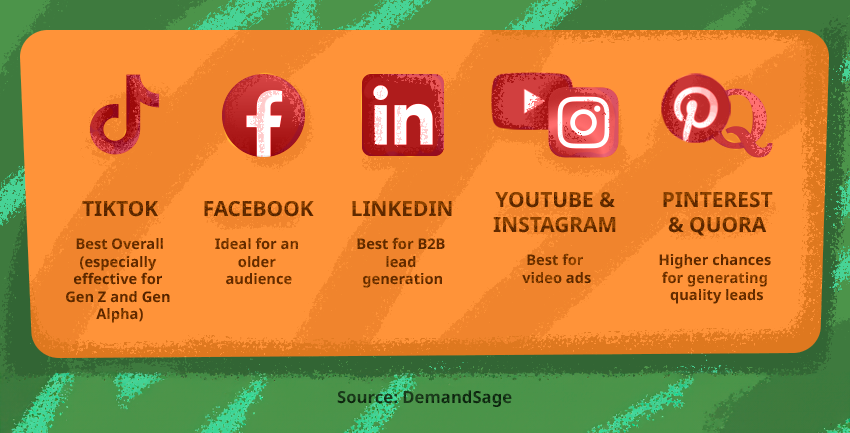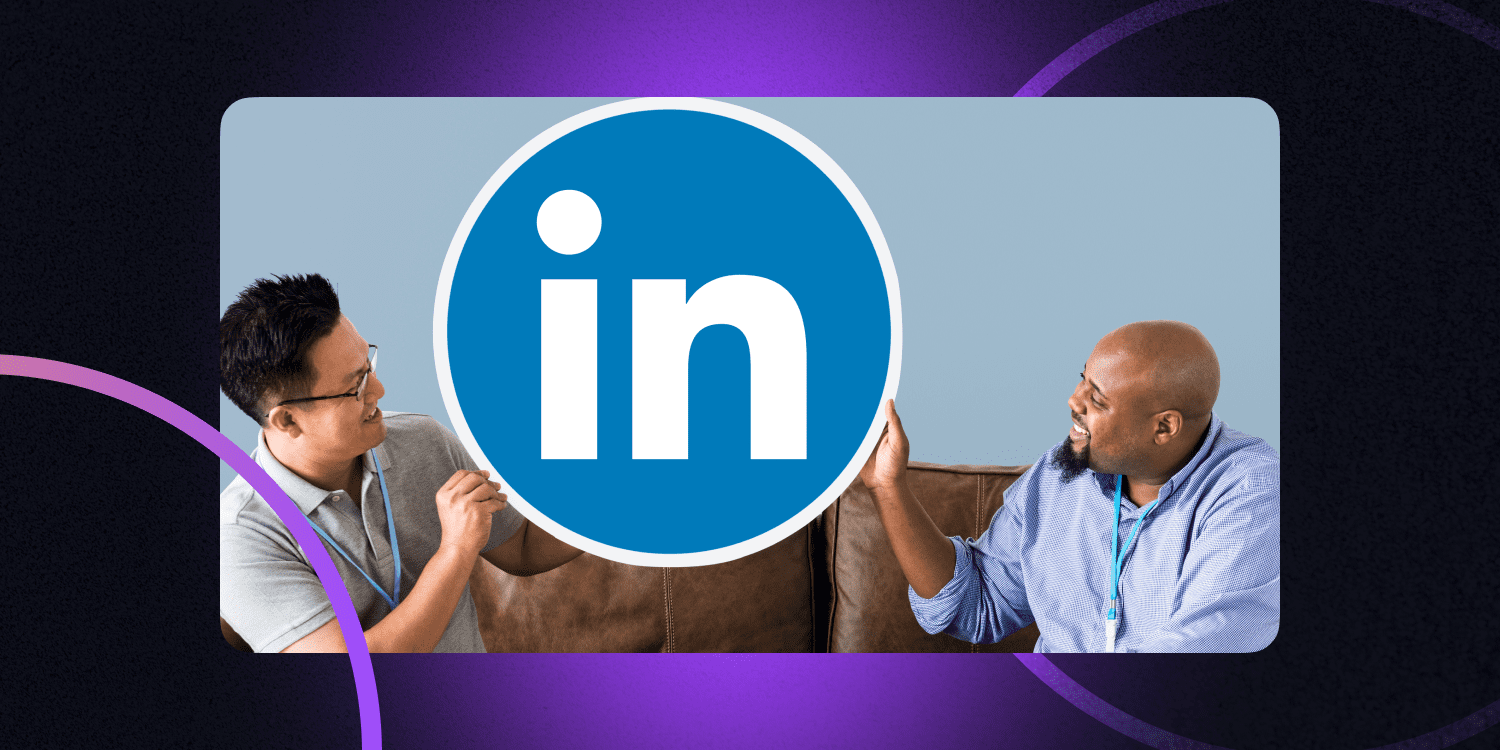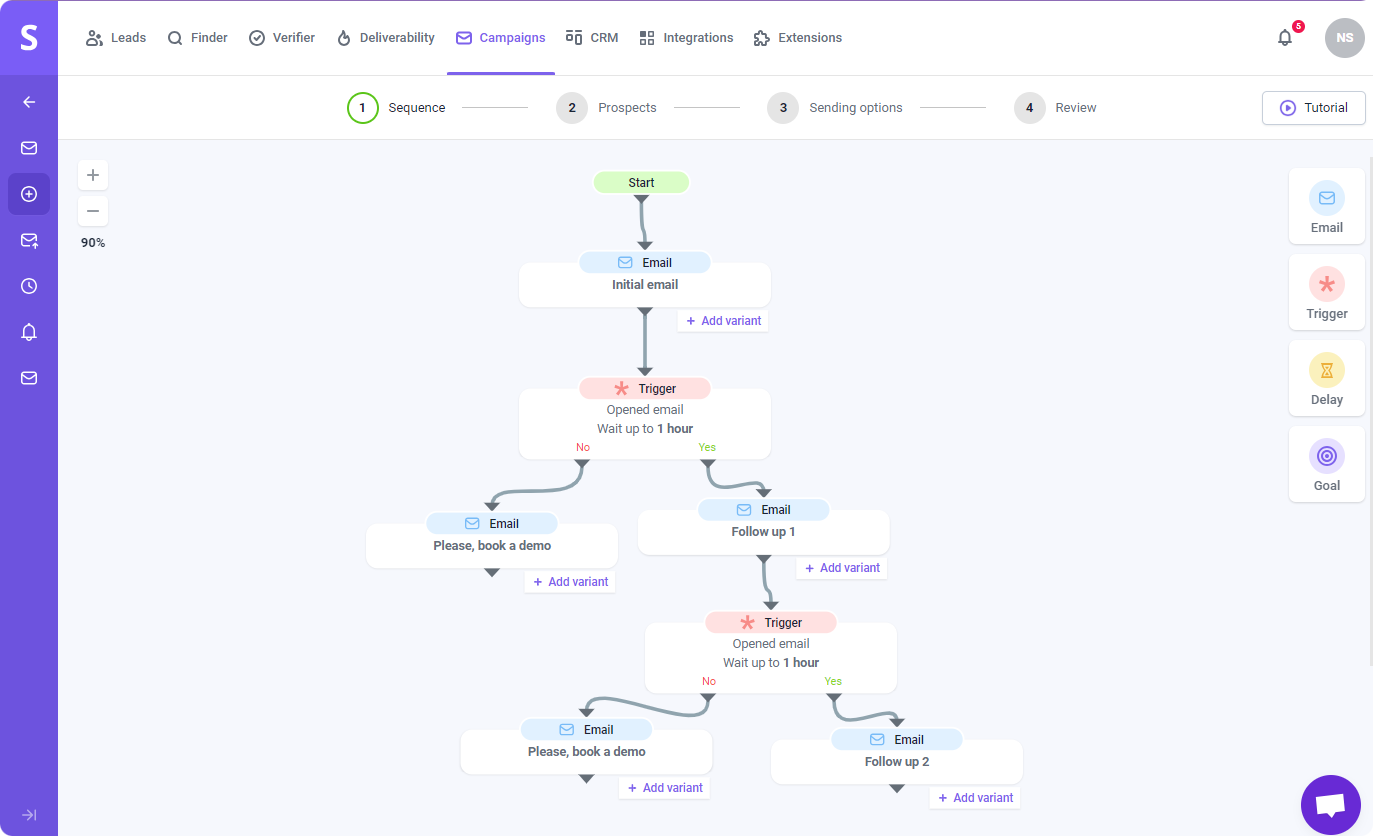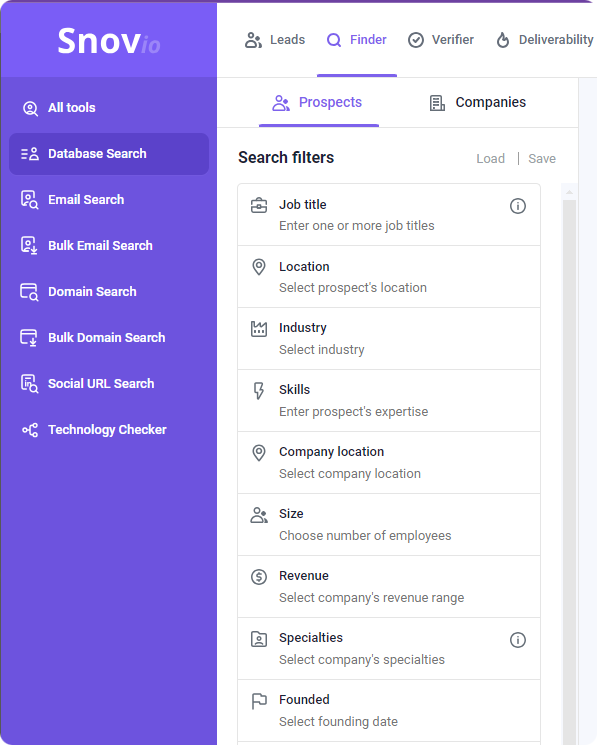So you’ve probably spent a few years working as a marketer or sales representative, gained tons of insights and valuable experience, and now you are considering kickstarting your own lead generation business.
To find your footing, you need some diligent research and insider tips. Let this post be your friendly guide through it all, presenting all the essentials to get you up and running.
Outline:
- What is a lead generation business?
- Why start a lead generation business?
- Six vital steps to start lead generation business
- How to attract the first clients for your lead gen company?
- Key methods to generate leads for your clients
- How much does it cost to start a lead generation business?
- Bottom line
What is a lead generation business?
A lead generation business is an intermediary company or agency that provides prospects for other companies.
Lead gen companies act as brokers getting their commission for solving the biggest challenge for 61% of marketers—generating quality leads.
|
THINGS TO KNOW While over 85% of B2B companies claim lead generation is their top marketing goal, finding quality leads (i.e., those capable of converting into customers) still remains a struggle for businesses worldwide. A staggering 79% of generated leads never convert into sales. Considering these data, there is a high demand for lead generation agencies. |
Need more reasons to open your own lead generation agency? Keep on reading!
Why start a lead generation business?
Simply put, the lead generation industry is booming. It reached $3.24 billion in 2023 and will most likely go even higher this year. The critical need for quality leads drives such impressive growth: 53% of marketers now allocate over half (!) of their budgets to lead generation, and 58% plan to increase these budgets shortly. So, answering your question, “Is lead generation business profitable?” we say, “Yes!”
The future for lead gen companies looks bright and promising. The average cost per lead in B2B sectors is around $200. With the majority of midsize to large companies generating fewer than 5,000 qualified leads per month, there’s a clear demand for effective lead generation services.
Yet, running a lead gen company means high responsibility, as your actions will correlate directly with the company’s success. Therefore, you need a deep understanding of the market and a thought-out strategy.
Six vital steps to start lead generation business
In this chapter, we’ll break down the essential steps you need to take to start a new chapter in your marketing career.
How to start lead generation business:
✅Choose your niche
✅Determine fees and costs
✅Identify your target audience
✅Develop relevant lead generation strategies
✅Focus on a proper outreach
✅Measure and analyze your lead generation activities
1. Choose your niche
Today’s lead generation market is vast, and specializing in a specific industry or category can give you a competitive advantage. Narrowly focused agencies tend to stand out more and can offer tailored services that broad-spectrum agencies usually can’t.
Hence, selecting a niche must be your first step. Tech startups, financial services, or maybe real estate? Choose the field that you’re knowledgeable or interested in. Additionally, conducting market research to determine the most profitable niches would also bring valuable data to consider.
|
→ Check out your potential competitors: learn about the top 15 lead generation companies and agencies in 2025 |
2. Determine fees and costs
Achieving a balance between offering fair prices that reflect your value and ensuring financial sustainability is crucial for your lead generation agency’s success. Though, it’s also challenging. If you set prices too low, you might attract more clients but might not cover expenses, while pricing your services too high might deter potential customers.
So, when setting your fees, consider factors like the complexity of the lead generation process for your niche, the tools you’ll need, and the time you and your team will invest in it.
3. Identify your target audience and build customer relationships
Knowing your target audience includes understanding their business goals and challenges. This valuable information will help you tailor your services to meet their specific needs.
For example, a survey revealed that 68% of companies struggle with identifying their sales funnel. It means there’s a vast opportunity for your lead gen business to build relationships with these companies by offering valuable insights on what steps they need to take to close more deals.
Then, you’ll scale your value by providing these businesses with qualified leads who are genuinely interested in your client’s product or service. This will undoubtedly bring you the desired conversions and help you gain a loyal customer.
4. Develop relevant lead gen strategies
Effective lead generation tactics vary from niche to niche. They include SEO, content marketing, using LinkedIn for B2B leads, or a blend of them.
Let’s take a closer look.
- SEO: Essential for niches where customers search online. It’s cost-effective, with leads costing 60% less than traditional ads.
- Content marketing: Used by 76% of marketers, it’s an excellent tool for every field, but especially for education-based niches such as podcasting.
- Social media: 66% of marketers successfully generate leads after spending only 6 hours per week on social media marketing.
Social media platforms have their audiences, so it is crucial to take that into account when planning your next lead generation campaign.

The goal is to show your clients that you can match your lead generation strategies with their unique needs, using data to guide your choices and integrating it smartly for maximum impact. For example, combining LinkedIn outreach with SEO-driven content in tech industries can be particularly effective.

LinkedIn Sales Prospecting: Techniques, Use Cases, New Method Tested
December 19 2025
5. Focus on a proper outreach
In lead generation business, outreach is fundamental as it can significantly improve lead quality. It’s like having a one-on-one conversation with prospects, which is much more engaging than generic advertising. You can tailor your messages based on the recipient’s interests, industry, or behavior, and this targeted approach means your messages are more likely to resonate with the addressees, increasing the chance they’ll respond.
You can try various outreach strategies, such as:
- personalized cold email campaigns
- social media messaging
- cold calling
|
THE POWER OF AUTOMATION About 80% of marketers believe that marketing automation helps generate and convert leads on a large scale. So, you shouldn’t neglect the power of an automation solution for your business. |
6. Measure and analyze your lead generation activities
You need a clear understanding of how your lead generation company performs.
Which strategies are bringing in the best leads?
Where are you spending money with little return?
You should know the answers to these questions to fine-tune your lead generation campaigns, ditching what doesn’t work and doubling down on what does. Otherwise, you risk going down the wrong path and losing your clients.
You get a real sense of your agency’s effectiveness by tracking key metrics like conversion rates (how many leads turn into customers) and the cost per lead. Keep in mind that measuring and analyzing your activities should be an ongoing and regular process so you can steer your agency in the right direction.
How to attract the first clients for your lead gen company?
Starting a lead generation business brings its first big challenge: attracting initial clients. In this chapter, we’ve prepared some actionable Problem-Solving strategies to overcome this hurdle.
Challenge #1: Unclear value proposition
Solution: Clearly define your offer
To find the first clients for your lead gen business, you should clearly articulate the unique value your agency provides. Develop a compelling elevator pitch that succinctly communicates how you can solve clients’ challenges. A compelling value proposition will attract customers and serve as a guiding principle for your overall lead generation business strategy.
Challenge #2: Building credibility
Solution: Leverage your network and referrals
As a new business owner, try using your existing professional network for referrals. Reach out to connections from previous roles and use LinkedIn and other platforms to share your expertise. Personal referrals and a positive online image are amazing tools in establishing your first customer database.
Challenge #3: Visibility in a crowded market
Solution: Use social media smartly
LinkedIn is a well of opportunities for B2B networking. Share your approach to lead generation, insights about industry trends, and some of your marketing experiments. Comment on the posts of potential clients and industry leaders and participate in relevant discussions.

How to Reach Out on LinkedIn in 2026: Tips & Outreach Templates
December 12 2025

How To Book A Meeting On LinkedIn: Snov.io Experience
December 19 2025
Instagram, Twitter, and Facebook are best for sharing infographics on lead generation statistics, short clips from your workshops or webinars, and even behind-the-scenes glimpses of your work life. You can also create polls, quizzes, and interactive posts that engage your audience.
Quora is an underrated platform where you can demonstrate your expertise. Look for questions related to lead generation and provide valuable answers. This can drive traffic back to your website or LinkedIn profile. You can also share your own lead generation experiences, which can be interesting to your potential customers on a more personal level.
By using social media platforms with your ideal customer profile in mind, you can significantly boost your agency’s visibility and build a community around your brand. In turn, this community may bring you more potential customers.
Challenge #4: Outreach rejection
Solution: Be persistent with follow-ups
Rejection in cold outreach is a common thing, unfortunately. But your success will depend on your next steps. Don’t give in after a potential lead neglects your cold email or call. Provide follow-ups. Luckily, there are numerous solutions that can help you plan your follow-up strategy.
For example, the Snov.io Email Drip Campaigns tool helps you build your cold outreach sequence from start to finish. You can program all follow-up emails to be automatically sent to potential leads who have rejected your first outreach efforts at a particular time of day with a certain interval.

Alternatively, you can also try out Snov.io’s ready-made follow-up templates or rely on the Email AI Assistant to craft highly personalized follow-up emails that would be more relevant to your recipients and encourage them to accept your offer.
Challenge #5: Demonstrating value
Solution: Focus on your expertise over results
Getting clients when your business is brand new and you haven’t built a reputation yet is a complicated task. Understandably, companies don’t want to put their marketing budgets at risk, so they are more likely to pay attention to established agencies with proven experience.
Nonetheless, there are some tricks that can help you. For instance, it’s worth asking your clients for testimonials in exchange for a discount or creating case studies to showcase your lead generation techniques, expertise, and lead generation tools you use.
|
CASE STUDY Snov.io has created Snov.io Academy, where everyone can advance their knowledge in lead generation, outreach campaigns, and much more by taking free Udemy courses. Snov.io proves to be an expert by providing value in each interaction and helping you boost your sales with actionable and profitable strategies. |
Key methods to generate leads for your clients
In this chapter, you’ll find methods and sources to use and mix to develop an individual lead generation strategy for your client’s businesses.
Methods to generate leads for your clients
- Lead generation tools
- Search Engine Optimization (SEO)
- Social media
- Cold email outreach
- Paid ads
Lead generation tools
One of the most efficient methods to build a lead database for your lead gen business is automation. For example, Snov.io Email Finder can access a vast database, pulling relevant contacts based on specific criteria like name, industry, company name or size, job title, and more.

This tool lets you quickly gather contact information for prospects in your target niche, saving time and increasing precision in your lead generation efforts.
Search Engine Optimization (SEO)
SEO for organic marketing is hard to overestimate. It involves optimizing your or your client’s online resources to rank higher in search engine results for relevant keywords. This method is particularly effective for long-term lead generation as a well-designed SEO strategy can attract more visitors who search for solutions your client provides.
The whole complex of SEO activities usually includes creating quality content, crafting a solid link-building profile, and optimizing website elements.
|
HOW TO BUILD A STRONG LINK-BUILDING PROFILE Create high-quality content that resonates with your target audience. Engage in guest blogging, collaborate with influencers in your industry, and use social media to increase the visibility of your content. Your aim should be to acquire backlinks from websites that are trustworthy and relevant to your niche—this relevance is a key factor in the weight search engines provide to each backlink. Learn more about strategies for creating a link-building profile in this post. |
Social media
Social media platforms are valuable resources for lead generation. LinkedIn, Facebook, Twitter, Instagram, and even TikTok can be used to engage with potential customers. The key is to provide value through content that educates, entertains, or informs your audience, creating opportunities to engage with audience.
For B2B lead generation, we strongly recommend you make the most use of LinkedIn. This social network provides a perfect opportunity to connect with decision-makers and cultivate professional relationships with potential customers. Consider the possibilities: a vast network of 1 billion users at your fingertips!
Cold email outreach
Cold email outreach is a proactive strategy. It involves reaching out to people who don’t know you or your business.
This may sound risky, but this approach will bring positive results if done right. The key is to personalize your email message to every recipient and showcase the value of your service to a client.
With tools like Snov.io Email Drip Campaigns, you can automate and personalize your cold outreach at scale.
In addition, you can A/B -test your campaigns, different types of emails, or just parts of them, such as subject lines, call-to-actions, or email body, to determine which option is most effective.
Furthermore, consider including a clear and concise invoice email strategy in your outreach sequence to ensure timely payments.
Paid ads
Advertising on platforms like Google Ads or social media can yield immediate results. It also allows for precise targeting to specific demographics, interests, and behaviors, which makes your ads more relevant to the audience.
In this realm, a partnership with Google ads agencies can offer a strategic advantage, optimizing campaigns for maximum visibility and conversion, thus ensuring that your investment translates into tangible leads and, ultimately, sales growth.
However, this method may be rather costly as paid ads require continuous financial feeding. Once you stop paying, the traffic and leads usually stop as well.
Moreover, many people don’t appreciate nagging and distasteful ads, so it’s important to make them appealing and engaging. In addition, some users develop so-called ‘ad blindness,’ subconsciously ignoring the content inside your advertisement. All this can lead to lower click-through rates for paid ads. Considering the cost of paid advertising, not all your clients will be ready to invest. So, the best way out for your lead gen company is to balance paid advertising with organic lead generation strategies.

How much does it cost to start a lead generation business?
One of the first questions a novice entrepreneur is likely to ask is, “How much does it cost to start a lead generation company?”
Well, the cost can vary, and it depends on several factors:
- Size of your company. How many employees are you going to hire? Are you going to work remotely or rent an office? Questions like this will help you determine the size of the initial capital you need to set aside to start your business.
- Technology and tools. Investing in software tools like CRM systems, lead generation software, etc., also requires financial resources. These tools are vital but come at varying prices. Choose the ones that fit your business needs and are cost-effective.
- Marketing and website. Costs can vary based on factors such as the scope of services, the complexity of design and functionality, etc. For example, instead of hiring a boutique design agency to create a website using an AI website generator for you, try searching for freelancers who can provide similar results for less money. Additionally, you can use tools like a reputable privacy policy generator to help easily make essential legal policies for your website to meet the data privacy requirements for marketing.
- Legal and administrative costs. Depending on your location, there may be legal fees for business registration, licenses, and possibly insurance. For instance, it costs $50 to start an Arizona LLC. In contrast, forming one in Texas typically costs about $300 for the initial filing.
Here is an example of rough calculations:
Initial setup
It could range from a few hundred to tens of thousands USD. For instance, if you’re tech-savvy, you can set up your own website and take advantage of free automation tools at the beginning of your journey. Or you can allocate a bigger budget and invest in online ads, professional website developers, and a spacious office.
Ongoing costs
These include software subscriptions, salaries for your employees (if you have them), potential administrative costs, and marketing initiatives. You could be looking at anywhere from $100 to several thousand dollars per month, depending on how many people work with you and what strategies you choose.
Contingency budget
It’s always wise to set aside extra resources for unforeseen expenses. A small contingency fund can help you face unexpected costs without significant stress.
The good news is that starting a local lead generation business is often more affordable than many other types of startups, especially if you start small and scale as you grow. The key is to start modestly and be ready to invest smartly.
Bottom line
Starting a lead generation business, attracting first clients, and setting a solid foundation for your lead gen company is not easy. But hey, Rome was not built in a day! Now you know what essential steps you need to take to help your new company succeed and prosper. Concentrate on quality leads and equip yourself with robust tools like Snov.io to automate email outreach and lead generation for your customers.
And remember: every big venture starts with a first step. And who knows, maybe your lead gen business will be the next big thing in the industry!









